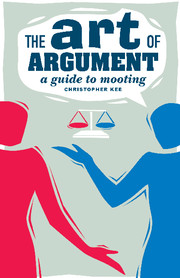Book contents
- Frontmatter
- Contents
- Preface
- Acknowledgments
- Part 1 Making the most of a moot
- 1 Introduction
- 2 You've made the team – what next?
- 3 Being part of a team
- 4 Building an argument
- 5 Written documents
- 6 Oral submissions
- 7 Practice moots
- 8 The competition itself
- 9 After it's all over
- Part 2 References and resources
- Part 3 International moots
- Index
1 - Introduction
Published online by Cambridge University Press: 05 June 2012
- Frontmatter
- Contents
- Preface
- Acknowledgments
- Part 1 Making the most of a moot
- 1 Introduction
- 2 You've made the team – what next?
- 3 Being part of a team
- 4 Building an argument
- 5 Written documents
- 6 Oral submissions
- 7 Practice moots
- 8 The competition itself
- 9 After it's all over
- Part 2 References and resources
- Part 3 International moots
- Index
Summary
WHAT IS MOOTING?
The adjective moot is originally a legal term going back to the mid 16th century. It derives from the noun moot, in its sense of a hypothetical case argued as an exercise by law students. Consequently, a moot question is one that is arguable or open to debate. But in the mid-19th century people also began to look at the hypothetical side of moot as its essential meaning, and they started to use the word to mean “of no significance or relevance”. Thus, a moot point, however debatable, is one that has no practical value. … When using moot one should be sure that the context makes clear which sense is meant.
The American Heritage® Dictionary of the English Language, Fourth Edition, Copyright © 2000 by Houghton Mifflin CompanyThe way in which the word moot is used has evolved over time, as the introductory quote indicates. However, for our purposes we need to stick with the original mid 16th century meaning. When you participate in an international mooting competition, you will be part of a group of law students engaging in the exercise of arguing a hypothetical case. This definition remains true whether you are presented with an extremely detailed set of facts or a very brief two-page problem; whether you are arguing your case before an arbitral tribunal or before a court of law.
Information
- Type
- Chapter
- Information
- The Art of ArgumentA Guide to Mooting, pp. 3 - 6Publisher: Cambridge University PressPrint publication year: 2007
